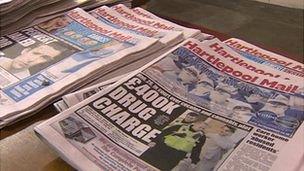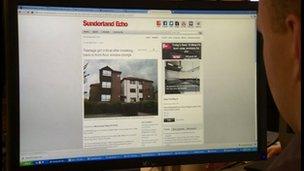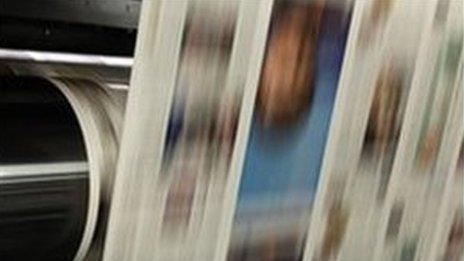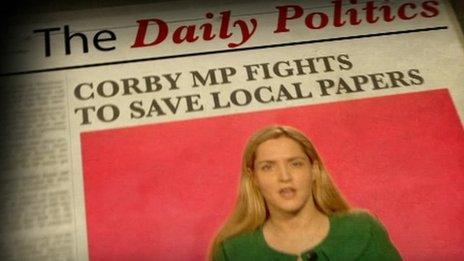Can local newspapers survive in the internet age?
- Published
- comments

Like many local newspapers the Hartlepool Mail has seen a fall in sales
They pride themselves at being at the heart of their communities but the figures show that fewer and fewer of us are buying local newspapers.
Circulation has dropped by a quarter in the last five years and that fall shows no sign of stopping.
In the last set of figures, external many newspapers saw an annual fall of 10% in sales with dailies hit particularly hard.
It's no wonder then that some publishers are considering big changes to maintain their businesses.
Daily to weekly
Johnston Press owns dozens of titles across the UK but has caused controversy by proposing to alter the way it works.
Some of its daily papers are being converted into weeklies and more may follow.
And in addition, some functions are being centralised away from the communities served by the newspapers.
In the North East, some advertising staff and journalists are being moved out of Hartlepool and South Shields to Sunderland.
This has caused concerns that a newspaper like the Hartlepool Mail will become less local by being partially produced 20 miles away in Sunderland.
North East Press, which is owned by Johnston Press, says the changes at the titles are about ensuring their survival rather than managing their decline.
It says the staff that need to be local will still be based in Hartlepool and South Shields, but that it's sensible to centralise some functions in order to cut costs.
Managing director Stuart Birkett said: "The investment in journalism and advertising staff will remain in those communities, but where back office functions can be centralised that makes sense.
"It doesn't feel like a crisis to me. There are challenges but also huge opportunities."
Online growth
And the group is bullish about the future, because the one silver lining for the local newspaper industry is the growing number of people accessing their websites, external.
While the Sunderland Echo, external saw sales of its newspaper decline by 10% last year, the number of online users rose by 25%.

Although sales of physical newspapers are declining, more people are accessing their websites
People then are still reading local news but in a different way.
The problem is they are generally accessing it for free rather than paying for it.
North East Press says it is now attracting more advertising online because of the growth in people clicking on its site.
It says it's also winning back some of the property, motors and other classified ads lost to other websites.
They are also hoping that people will begin to pay for apps to deliver the newspaper to their tablet computers.
It is early days on that score though and some in the industry doubt that app subscriptions will ever be enough to replace sales of the physical paper.
For now at least no newspaper group has proved definitively that you can make websites pay their way.
State subsidy
But if that isn't the answer, what is?
Some MPs have talked about offering financial help to the industry.
Local newspapers play a big role in scrutinising councils and other officials - a role that nobody else can do as well.
The Corby Conservative MP Louise Mensch, external believes they are providing a public service and has talked about a state subsidy.

Conservative MP Louise Mensch believes it is time to subsidise local newspapers
She said: "When we consider how many things receive national subsidies that only have a minority appeal, surely local newspapers, at the heart of their towns and villages, deserve some of that government support as well.
"Local papers are not only loved by people in their local communities, they are the only vehicle that holds local politicians to account and they have an irreplaceable role in our local democracy.
"They can't be replaced by the internet and we have to look at community ownership as a model going forward and ask ourselves if some government subsidies shouldn't be targeted towards something that people really use, enjoy and need on a daily basis."
The newspaper industry is nervous about state subsidy though. They fear their independence will be compromised if they become reliant on government funding.
Lost revenue
Many editors do believe there is more that politicians could do though.
The government is currently considering ending the requirement for councils to publish traffic notices in local newspapers.
The industry says such plans should be abandoned as it will cost newspapers millions in lost revenue.
And Northern Echo, external editor Peter Barron believes MPs should look at what other help they could give.
He said: "We do not want to be in the pocket of the government but that's not to say that ministers shouldn't look creatively at what benefits, tax incentives and help local newspapers could be given.
"We just need to be careful about our independence."
Others though think the industry needs to scale down its desire for high profit margins and be prepared to adapt.
The Bishop Auckland Labour MP and Shadow Media Minister Helen Goodman, external said: "Last year Johnston Press made a 17.5% operating profit. Compare that with Tesco - the most successful retailer in the country - that had a profit margin of 6%.
"If Tesco can keep going with a 6% margin, the local newspaper chains really ought to be able to get their business models right.
"What concerns me is that the local people do still want a local newspaper and they are being let down by these big groups."
There is no imminent danger that local newspapers will disappear altogether, and of course they have always had to adapt to change.
But how they and the politicians respond may decide whether they remain at the heart of our communities or gradually become a part of history.
- Published2 May 2012
- Published27 April 2012

- Published25 April 2012
